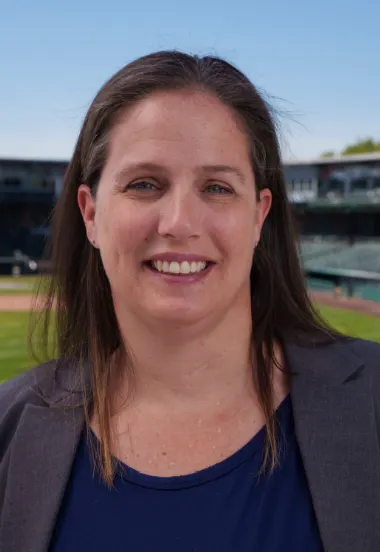Editor’s note: The importance of real-world learning connections can’t be overstated. This interview by our sister publication, Facilities Dive, highlights one such connection between STEM and sports facility operations.
Building systems always need work so, for a facility manager, there’s no better skill than problem solving, says Melissa Dallenbach, director of stadium operations at Delta Dental Stadium in Manchester, N.H., home of the Double-A minor league baseball team the Fisher Cats.
In a previous life, Dallenbach was a math teacher. Now, she takes the same problem-solving approach she used to solve equations to understand why a mechanical system isn’t working. It’s about breaking down problems into their component parts, she says. “Math is very much a life skill,” she says.
Dallenbach moved into facility management about eight years ago when she left teaching to become the athletic director at Lake Brantley High School in Altamonte Springs, Fla. In that role she cut her teeth overseeing building systems as part of a broad set of duties that included managing coaches, students and the business operations of the athletic department.

At Delta Dental Stadium, much of the infrastructure is close to 20 years old so she’s identifying what systems need to be upgraded, and when. In the meantime, she’s applying her problem solving skills to keep those systems operating as they near the end of their useful life.
To learn about her career path and how she’s tackling the challenges that come with the job, Facilities Dive sat down with Dallenbach for a short conversation.
The following Q&A has been edited for clarity and length.
FACILITIES DIVE: How did you become involved in facilities management?
MELISSA DALLENBACH: I was the athletic director at a high school, so it was an unconventional path. I dealt with ticket sales, corporate partnerships, facilities, coaches and student athletes, so it encompassed all of that. This job narrows what I do to facilities and operations.
What’s the most important skill facilities management requires?
Being able to problem solve, because there are so many issues that arise. The water heater isn’t working. Where is the hot water not being routed in the correct direction? Then you have to go from that to, how do I correct the issue? Do I need to call the plumber or can I fix it myself? How does that fit into the budget? I could call the plumber for everything, but that’s not cost-effective.
Other than experience, is there something that can train you for problem-solving?
Before I was an athletic director I was a math teacher, and that provides great training. It helps you figure out how to go from Point A to Point Z and all the steps in the middle. I used to tell the kids, “You probably won’t have to solve an algebraic equation in your future job, but you will have to figure out how to solve something.” When I came into this job, I didn’t know how to fix the toilet, but it’s not necessarily about how to fix a toilet; it’s about how to find out how to fix a toilet.
Can you talk about laws or regulations you have to comply with.
For minor league baseball, we have what’s called a PDL, a professional development license. The league comes to us and says, “This is what your facility has to have to be part of this minor league baseball program.” That includes security cameras. You have to have cameras pointed at all of the clubhouse doors, all of the team areas, to make sure their stuff is secure. You also have to have certain square footage in clubhouses or storage areas, the field has to be a certain grade, walls have to have certain padding. So, our facility has to be up to that standard.
Then we have state and city rules. For example, we have to get the elevators inspected once a year, and we have to work with our fire equipment company to get our fire extinguishers and sprinkler system inspected. There are codes that go along with all of those.
What keeps you up at night?
Just keeping the facility maintained. The stadium is 20 years old so there’s a lot of upkeep and a lot of upgrades we need to work on. Things are getting near the end of their lifespan so issues are starting to pop up. Identifying what’s nearing the end of its lifespan is a big part of my job these days. That’s probably my biggest challenge right now.
What’s your role in getting capital to make upgrades?
I come up with a list for the general manager of the capital improvement projects we need for the foreseeable future. We’re going to need to replace the heat pump or the HVAC system. We need to recoat the concourse floor. All of these are big projects. We discuss them together, whether it’s a this-year project or a next-year project, and whether we talk to the ownership group about it or the city, because we lease the facility from the city. We discuss with them how we're going to pay for what we need, whether it’s us or them or a mutual project.
Since your two facility jobs involved sports, would you consider making a move that had nothing to do with sports?
I would consider it, but the sports world is definitely the draw for me. Coming to work every day in a baseball stadium is fun. Half of my job is just watching baseball. It’s rough when they lose but it’s still fun.








 Dive Awards
Dive Awards














